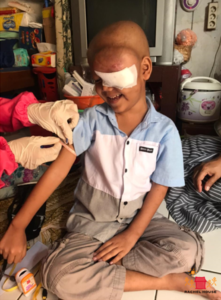
Ribka had just stepped into the house and was greeted by a little boy who was teetering excitedly towards her. Even though his face looked pale, Hadi had a cheerful smile spread across his face.
“Hadi misses Nurse Ribka the most.” Said grandma as she held Hadi back while nurse Ribka dons her PPE, getting herself ready to enter the family space.
“Wait until I’ve changed my clothes, Hadi,” Ribka said to cajole the little boy she adores.
“Usually he doesn’t want to walk at all as his knees are quite weak. But, when he sees Nurse Ribka, he gets so excited that he just tumbles happily to her.” Grandma smiles at her grandson.
While waiting for Ribka to get ready, Hadi pointed excitedly at the bag that Ribka had brought with her. He knows that the bag contains red grapes, his favorite fruit. Hadi rarely gets to eat fruit, especially grapes – because they are too expensive for the family to buy.
“I want that…” He said pointing to the bag without completing his sentence.
Little Hadi and his mom live in a one-bedroom house shared with his grandparents and two of his uncles. As a single parent, Hadi’s mom has to work day and night, not only to support her family, but to pay for Hadi’s medical expenses. This leaves them with hardly anything left for their living, much less luxury items like fruit or grapes.
Hadi was diagnosed with Retinoblastoma when he was 3. While his mom had noticed that the pupil on his left eye looked different, like a “cat’s eye”, the family simply did not have the knowledge nor the financial means to take him to the doctor. It was not until the eye turned alarmingly red and he was vomiting non-stop that he was taken to the doctor for investigation. For the last 2 years, chemotherapy had been Hadi’s battleground, and remission has been the family’s daily prayer.
“Let’s start our checkup, shall we?” Ribka said to the boy who had been patiently waiting for her to don her PPE. Hadi nodded and happily went closer to Ribka, ready to “play”.
After conducting a general physical examination, Ribka proceeded to look at the wound dressing of the large mass on Hadi’s left eye.
“Most kids are afraid to be examined, but you are a brave boy!” Said Ribka, as she cleaned the abscess where the eye had been removed to stop the spread of cancerous cells.
“So it won’t hurt anymore.” Answered Hadi, with his childlike voice.
“Wow, so when I am here, I can make the pain go away?” Ribka’s question was answered with Hadi’s enthusiastic nod and smiles.
“I am relieved to see how much better Hadi is now since nurse Ribka came into our lives. He used to cry such a lot, complaining of pain in his eye and his head. We didn’t know how to help him. We could only lament about our ill fate.” Grandma’s eyes filled with tears as she shares the family’s experience.
Grandma is Hadi’s main caregiver during the day when Hadi’s mom is at work. She often cries when she shares her fears and concerns about Hadi. “I am grateful that God still gives me time to live, so that I can be here to help take care of Hadi.” Grandma said quietly, with eyes full of tears.
Rachel House was established with the belief that no child should ever have to live or die in pain. This is what drives us to provide palliative care service for children living with serious illnesses like Hadi at free of charge. Pain and symptoms are managed at the comfort of the patients’ homes so that children can live with optimal quality of life in their remaining days.
“I am grateful to Rachel House for the transportation support. Now Hadi and I don’t need to wake up at 4am to get to the hospital appointments on time. ”
Hadi and his grandmother used to take public transport to the hospital. From their home, they had to change 4 (four) buses. This meant waking up at 4 AM in order to get to the hospital for the 8AM registration time. Often, grandma had to carry Hadi on her back as the poor little boy could not walk far. By the time they reached the hospital, Hadi would be crying from the sore and itchy wound on his left eye.
“He absolutely loves riding in the taxi now because it is cool inside the car. In fact, he said he likes it better than being at home because of the air-conditioning that helps make his eye less itchy and sore.” Said Grandma.
“Is that right, Hadi?” Asks Ribka. Hadi smiled shyly and nodded his head.
Times like these remind Ribka of what important teachers her little patients are for her. Riding an air-conditioned car maybe a normal thing for most of us. But not for Hadi. He is filled with joy and gratefulness for the things most of us take for granted. Hadi’s ability to celebrate every small moments of joy in the face of great adversity is a lesson for Ribka.
And, Hadi’s smile is totally infectious. The visit has completely energised Ribka and filled her with happiness and gladness. The tiredness she was feeling before the visit is now erased and replaced with the memory of the sweet smile on Hadi’s face.